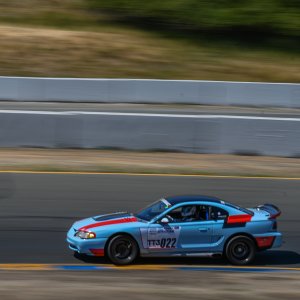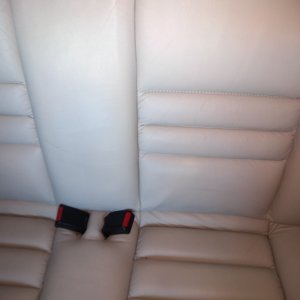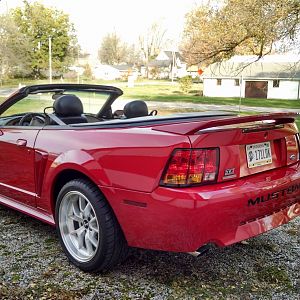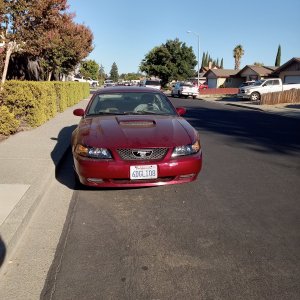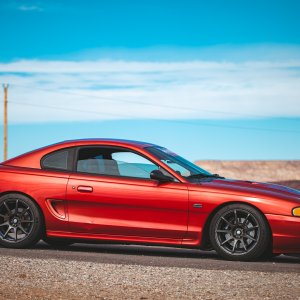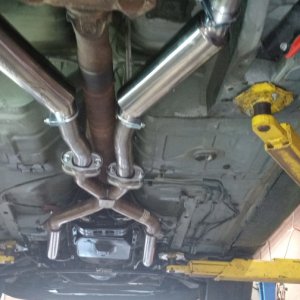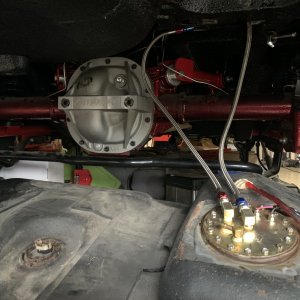So I've been thinking about this for a while. I decided to make a thread about it, but wasn't really sure how to proceed. I'm still not really sure. But I figured I might as well get to it anyway.
Warning! This thread will have words. A lot of them. If you don't like reading, I'm sorry. If you do like reading, I hope you find the following was worth your time.
Torque and that Horsepower Thing
This may be info you already know. If so, sorry for rehashing it. I've been planning my HCI for a little while now, and I find myself sort of at a dilemma, particularly with the cam and to a lesser extent the intake. I have choices. I can get a cam that makes more low-end torque, or one that makes more high-end horsepower, but not one that does both (Note: sort of. There are cams that will shift the peak horpsepower and peak torque numbers up in the RPMs, this is sort of like having higher HP *and* higher TQ - but of course there will be much less low-end torque).
And now, the Question: so which do I want? Low-end TQ? High-end HP?
There are a number of old adages you may have seen, here's a couple:
There's an obvious trend here. If you search in the internet, you don't have to go too far to find a debate on TQ vs HP, which is more preferable. I myself have this debate...with myself. I have reached several conclusions, and also created a mathematical model of the situation. This model is by no means exact, as there are just too many variables in play and to accurately account for every single one of them is essentially impossible for me to do. So I do the best I can, and estimate as best as I can. For my model, while not exact, I think is still fairly accurate.
I created this model to compare "cars" with different engine configurations - one with low-end TQ vs one with high-end HP, which is actually faster, etc. Otherwise, everything I read or thought would be simply speculation. I wanted to know, with some degree of reasonableness, what the time from, say, 0-100 mph for that low-end TQ car would be compared to that of the high-end HP car. All in an effort to better understand and be able to choose the cam for my particular goals. I learned a couple things along the way.
The following is based upon my findings and my opinion. I don't profess to know the "real" answer. Just what I think. You are welcome to disagree, poke holes in my theory, tell me I'm wrong, etc. Because I might be. So, with that said, what I found can be summed up with:
Power (HP) is ultimately the thing that matters. But that is not to say torque (TQ) doesn't matter, as HP is a calculation of TQ. Power, however, is what gets you out of corners, down the track and wins races. However, they can be manipulated such that they are equivalent.
Okay, So What Does This Mean
Let's start by defining the two terms real quick: Torque is a (rotational) force applied to something. It's how "hard" something is being turned. Think of it as Work being done. Horsepower has an esoteric definition that involves literal horses. For this discussion, we don't care about that. Go look up the real definition if you are interested. What it means here, essentially, is how *quickly* that Work is being accomplished.
It can be summed up thus: Torque is the amount of Work being done, Horsepower is the rate at which that Work is accomplished. Carrying a box of books up a flight of stairs = Work. You can either walk up the stairs, or run up the stairs = Horsepower. Running up the stairs accomplishes the same amount of Work in less time. Thus, running up the stairs is "faster."
But you said they could be equivalent? Yes. Two people, three boxes of books. Two weigh 20 lbs. The third weighs 40 lbs. Person A with the 40 lbs box, walks up the stairs. Person B, with the two 20lbs boxes, runs up the stairs and deposits the first box, comes back down, grabs the second box and goes back up such that Person A and Person B arrive at the same time. While Person B was "faster" - they accomplished the same amount of work. So all things being equal other than what I described, they result in essentially the same outcome. Neither is "faster" - they are equal.
Well That's Cute, But What About My Car
The thing is, most of already have a car to start with, and not an unlimited budget for R&D to create our own transmissions, engines, etc. So we are sort of stuck with whatever the car designers/engineers have set for us. Typically this means enhancing what is already there. And it doesn't matter if it's a Mustang with some low-end grunt or a Honda S2000 AP1 with revline literally at the moon. Here's an exercise: which do you think is "faster:"
Think about it for a second....... The answer is the S2000. Did you guess correctly? In 0-100 MPH, the Mustang will get there in about 17.6 seconds. The S2000 will arrive in about 14.7 seconds. There's a lot more going on here, of course. Such as the weights of the cars (~3400 Mustang vs ~2800 S2000), the coefficient of drag, frontal area, and of course, the transmissions (more on this in a bit).
The point here is the higher HP car with "nothing" for torque will actually power out of the corners faster than the torquey Mustang.
But how can this be???????
The Crux of the Matter: The Transmission
It's all about the transmission. Horsepower is simply the measure of torque produced at a given RPM. But to make use of that torque, transmissions are employed. And the gearing is Everything. Literally. The reason the S2000 can power out of the corners better than the Mustang is because of the gearing. The gearing for the S2000 allows it to make the absolute most of it's torque, despite that there's not much of it. Were it not for the gears, then the story perhaps might be different.
The gears allow the driver to make maximum use of the power available.
If all things being equal, and two cars make equivalent HP - then go for the one that makes the most TQ. If you have two cars, 1 makes high TQ but lower HP, and another makes high HP, but low TQ, you probably want to head towards the one that makes more HP.
This is a very general statement. It really depends on the application of the car. But, in general, more HP (as opposed to more TQ) is the most desirable.
A Tale of Two Cars
The Honda S2000 is actually a really interesting comparison, as the AP1 variant (which is high-reving, lower torque) can be compared to the AP2 variant (not quite as high-reving, more torque). Two slightly different engines in almost the same exact platform. But which is more desirable from a performance perspective? Which do you think.....?
Well, it turns out, the AP2 is actually a tad faster. 0-100 MPH for AP1 is ~15.2 seconds, the AP2 is ~11.9 seconds. Granted, I've based these numbers on stock dyno plots, so there is of course space for errors. So perhaps the gap is a bit closer. But, given that the two cars make the same HP, the one with more TQ is "faster."
But, keep in mind, from our previous comparison of the 95 Mustang vs the "slower" S2000 AP1 - the AP1 was still quicker than the Mustang. It has more HP.
And this all kind of makes sense, right? After all, HP is a measure of how much Work the car engine can accomplish. A diesel can do a LOT of Work. But not very quickly.
In Conclusion
So to bring it back around, for me, I am looking for a cam that makes more HP, as opposed to more low-end torque.
Lastly, I will leave you with this to think about: F1 cars. F1 has, for all intents-and-purposes, unlimited budget. And those cars are fast. Fast fast fast. How do they fall out with regard to HP or TQ? Well, for HP, they are around 750 - 830 HP. And Torque? Around 177 ft-lbs. 177!!! That's less than my Mustang. Based on those old adages, am I to think my Mustang with more torque will be out of the corners faster than an F1 car? Yah, I don't think so...
So to wrap up:
Bonus, For Fun
Something that is asked a lot is what effect with a rear diff gear change have on the performance of my car. I ran this change on my car through my mathematical model. The results are interesting.
So, my car, with 3.55 gears, currently has a 0-100 MPH of ~17.6 seconds, a 0-60 MPH of ~6.7 seconds, and a top speed of around 122 MPH. If I were to swap in 4.10's, I would get 0-100 MPH in ~16.3 seconds, 0-60 MPH in ~6.4 seconds, and a top speed of around 112 MPH. So, certainly there's an improvement. But not a tremendous one. And I lose top speed. So the 4.10's make the butt dyno feel like it's faster, and it *is* a little faster, but in every day driving you probably won't notice. If you are drag racing, then every little bit helps.
Warning! This thread will have words. A lot of them. If you don't like reading, I'm sorry. If you do like reading, I hope you find the following was worth your time.
Torque and that Horsepower Thing
This may be info you already know. If so, sorry for rehashing it. I've been planning my HCI for a little while now, and I find myself sort of at a dilemma, particularly with the cam and to a lesser extent the intake. I have choices. I can get a cam that makes more low-end torque, or one that makes more high-end horsepower, but not one that does both (Note: sort of. There are cams that will shift the peak horpsepower and peak torque numbers up in the RPMs, this is sort of like having higher HP *and* higher TQ - but of course there will be much less low-end torque).
And now, the Question: so which do I want? Low-end TQ? High-end HP?
There are a number of old adages you may have seen, here's a couple:
Horsepower sells cars, torque wins races
Horsepower gets you down the straights, torque gets you out of the corners
There's an obvious trend here. If you search in the internet, you don't have to go too far to find a debate on TQ vs HP, which is more preferable. I myself have this debate...with myself. I have reached several conclusions, and also created a mathematical model of the situation. This model is by no means exact, as there are just too many variables in play and to accurately account for every single one of them is essentially impossible for me to do. So I do the best I can, and estimate as best as I can. For my model, while not exact, I think is still fairly accurate.
I created this model to compare "cars" with different engine configurations - one with low-end TQ vs one with high-end HP, which is actually faster, etc. Otherwise, everything I read or thought would be simply speculation. I wanted to know, with some degree of reasonableness, what the time from, say, 0-100 mph for that low-end TQ car would be compared to that of the high-end HP car. All in an effort to better understand and be able to choose the cam for my particular goals. I learned a couple things along the way.
The following is based upon my findings and my opinion. I don't profess to know the "real" answer. Just what I think. You are welcome to disagree, poke holes in my theory, tell me I'm wrong, etc. Because I might be. So, with that said, what I found can be summed up with:
Power (HP) is ultimately the thing that matters. But that is not to say torque (TQ) doesn't matter, as HP is a calculation of TQ. Power, however, is what gets you out of corners, down the track and wins races. However, they can be manipulated such that they are equivalent.
Okay, So What Does This Mean
Let's start by defining the two terms real quick: Torque is a (rotational) force applied to something. It's how "hard" something is being turned. Think of it as Work being done. Horsepower has an esoteric definition that involves literal horses. For this discussion, we don't care about that. Go look up the real definition if you are interested. What it means here, essentially, is how *quickly* that Work is being accomplished.
It can be summed up thus: Torque is the amount of Work being done, Horsepower is the rate at which that Work is accomplished. Carrying a box of books up a flight of stairs = Work. You can either walk up the stairs, or run up the stairs = Horsepower. Running up the stairs accomplishes the same amount of Work in less time. Thus, running up the stairs is "faster."
But you said they could be equivalent? Yes. Two people, three boxes of books. Two weigh 20 lbs. The third weighs 40 lbs. Person A with the 40 lbs box, walks up the stairs. Person B, with the two 20lbs boxes, runs up the stairs and deposits the first box, comes back down, grabs the second box and goes back up such that Person A and Person B arrive at the same time. While Person B was "faster" - they accomplished the same amount of work. So all things being equal other than what I described, they result in essentially the same outcome. Neither is "faster" - they are equal.
Well That's Cute, But What About My Car
The thing is, most of already have a car to start with, and not an unlimited budget for R&D to create our own transmissions, engines, etc. So we are sort of stuck with whatever the car designers/engineers have set for us. Typically this means enhancing what is already there. And it doesn't matter if it's a Mustang with some low-end grunt or a Honda S2000 AP1 with revline literally at the moon. Here's an exercise: which do you think is "faster:"
- a relatively stock 95 Mustang GT with about 185 RWHP and 244 ft-lbs TQ
- a relatively stock 02 Honda S2000 AP1 with about 190 RWHP and 136 ft-lbs TQ
Think about it for a second....... The answer is the S2000. Did you guess correctly? In 0-100 MPH, the Mustang will get there in about 17.6 seconds. The S2000 will arrive in about 14.7 seconds. There's a lot more going on here, of course. Such as the weights of the cars (~3400 Mustang vs ~2800 S2000), the coefficient of drag, frontal area, and of course, the transmissions (more on this in a bit).
The point here is the higher HP car with "nothing" for torque will actually power out of the corners faster than the torquey Mustang.
But how can this be???????
The Crux of the Matter: The Transmission
It's all about the transmission. Horsepower is simply the measure of torque produced at a given RPM. But to make use of that torque, transmissions are employed. And the gearing is Everything. Literally. The reason the S2000 can power out of the corners better than the Mustang is because of the gearing. The gearing for the S2000 allows it to make the absolute most of it's torque, despite that there's not much of it. Were it not for the gears, then the story perhaps might be different.
The gears allow the driver to make maximum use of the power available.
If all things being equal, and two cars make equivalent HP - then go for the one that makes the most TQ. If you have two cars, 1 makes high TQ but lower HP, and another makes high HP, but low TQ, you probably want to head towards the one that makes more HP.
This is a very general statement. It really depends on the application of the car. But, in general, more HP (as opposed to more TQ) is the most desirable.
A Tale of Two Cars
The Honda S2000 is actually a really interesting comparison, as the AP1 variant (which is high-reving, lower torque) can be compared to the AP2 variant (not quite as high-reving, more torque). Two slightly different engines in almost the same exact platform. But which is more desirable from a performance perspective? Which do you think.....?
Well, it turns out, the AP2 is actually a tad faster. 0-100 MPH for AP1 is ~15.2 seconds, the AP2 is ~11.9 seconds. Granted, I've based these numbers on stock dyno plots, so there is of course space for errors. So perhaps the gap is a bit closer. But, given that the two cars make the same HP, the one with more TQ is "faster."
But, keep in mind, from our previous comparison of the 95 Mustang vs the "slower" S2000 AP1 - the AP1 was still quicker than the Mustang. It has more HP.
And this all kind of makes sense, right? After all, HP is a measure of how much Work the car engine can accomplish. A diesel can do a LOT of Work. But not very quickly.
In Conclusion
So to bring it back around, for me, I am looking for a cam that makes more HP, as opposed to more low-end torque.
Lastly, I will leave you with this to think about: F1 cars. F1 has, for all intents-and-purposes, unlimited budget. And those cars are fast. Fast fast fast. How do they fall out with regard to HP or TQ? Well, for HP, they are around 750 - 830 HP. And Torque? Around 177 ft-lbs. 177!!! That's less than my Mustang. Based on those old adages, am I to think my Mustang with more torque will be out of the corners faster than an F1 car? Yah, I don't think so...
So to wrap up:
- If two cars have equal horsepower, the one with more torque will be "faster"
- If two cars have equal torque, the one with more horsepower will be "faster"
- If two cars have unequal torque/unequal horsepower (such that one has more torque, the other has more horsepower, and they are roughly equivalent cars), the one with more horsepower will be "faster"
- This all assumes that the cars have equivalent weight and shape - if the cars are vastly different, then the weight, coefficient of drag, frontal area, rolling resistance has a large impact on whether one car or the other is faster.
- This also assumes that the gearing is setup correctly to make use the HP/TQ.
Bonus, For Fun
Something that is asked a lot is what effect with a rear diff gear change have on the performance of my car. I ran this change on my car through my mathematical model. The results are interesting.
So, my car, with 3.55 gears, currently has a 0-100 MPH of ~17.6 seconds, a 0-60 MPH of ~6.7 seconds, and a top speed of around 122 MPH. If I were to swap in 4.10's, I would get 0-100 MPH in ~16.3 seconds, 0-60 MPH in ~6.4 seconds, and a top speed of around 112 MPH. So, certainly there's an improvement. But not a tremendous one. And I lose top speed. So the 4.10's make the butt dyno feel like it's faster, and it *is* a little faster, but in every day driving you probably won't notice. If you are drag racing, then every little bit helps.

